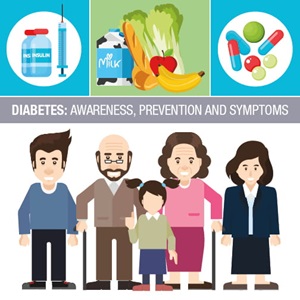Recent Posts
Life with diabetes: What happens as we age?


If you have diabetes, you might encounter the effects of complications as you move into the latter part of your life. According to the Centers for Disease Control and Prevention, 50 percent of adults age 65 and older have prediabetes and 25 percent have diabetes. Prediabetes is a condition in which blood sugar levels are higher than they should be, but not yet high enough to be diagnosed with diabetes.
These conditions are caused by multiple factors, including insulin resistance, usually as a result of obesity and inactivity; reduced insulin production from the pancreas; and loss of muscle mass.
EFFECTS OF DIABETES AND AGING
- Life-limiting complications — Having diabetes can result in nerve damage and persistent pain, vision loss, kidney dysfunction, memory changes, urinary incontinence or slow-healing wounds.
- Premature death — The likelihood of premature death increases due to co-existing conditions, such as heart disease, high blood pressure or stroke.
- Increased falls and injury — Low blood sugar levels, vision or hearing loss, and balance changes from neuropathy may increase your chance of falling and injury.
- Medication conflicts — You may be taking multiple medications to treat health conditions, which puts you at increased risk for side effects or drug interactions.
- Dexterity and vision loss — Your fingers or hands may not work as well as they used to, or your eyesight may be poor, making it difficult to use insulin or injectable medications.
- Financial burden — Medication and testing supplies needed to treat your diabetes can be costly, which could create budget constraints.
- Memory loss or function — You may not remember or think as clearly as before and may need assistance from relatives or friends.
- Poor nutrition — You may have limited access to healthy food because of finances or lack of transportation.
- Depression — Your level of independence may decrease due to changes in vision, mobility or finances, and you may become depressed.
PARTICIPATION IN YOUR TREATMENT PLAN
Early detection and treatment of diabetes and prediabetes can reduce your risk for long-term complications. It’s important to work with your diabetes care team to individualize your treatment plan, including limiting hypoglycemia, or low blood sugars, and cardiovascular conditions, such as hypertension, or high blood pressure, and lipid management.
Other ways you can be an active participant in your treatment plan include to:
- Talk with your health care provider about medication costs, vision loss, dexterity or balance concerns, memory loss or symptoms of depression.
- Discuss your diabetes care plan with your endocrinologist or diabetes educator. You also may want to meet with a dietitian to help you with meal plans.
- Gather resources from aging and disability resource centers, including information on physical activity, food assistance or other support options.
- Schedule a yearly dilated eye exam to closely monitor your eye health for vision problems or eye diseases.
- Do exercises that include balance, strength training and cardio to optimize your health.
- Use portion control for your meals. Remember to include vegetables, fruits, protein and calcium, while cutting down on sugary beverages and alcohol.
- Use assistive devices, such as walkers, to help you be more active if you have balance concerns.
- Check your feet and skin daily, and seek out prompt medical help if problems arise.
- Check your blood sugars frequently so you can identify changes in your blood sugar pattern. Notify your provider of concerns.
YOUR DIABETES JOURNEY GOALS
Set some realistic personal goals in your diabetes journey. Work with your health care team to promote positive health. Gather support from your family, friends and community to improve your quality of life.
Do you know your risk? Take the American Diabetes Association's 60-second test to find out.
By Mayo Clinic Health System staff.




